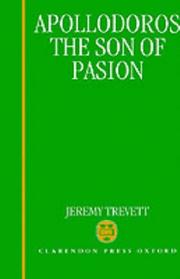| Listing 1 - 6 of 6 |
Sort by
|

ISBN: 0198147902 9780198147909 Year: 1992 Volume: vol *6 Publisher: Oxford: Clarendon,
Abstract | Keywords | Export | Availability | Bookmark
 Loading...
Loading...Choose an application
- Reference Manager
- EndNote
- RefWorks (Direct export to RefWorks)
History of ancient Greece --- Classical Greek literature --- Apollodorus of Athens --- Politicians --- Orators --- Biography. --- -Politicians --- -Statesmen --- Speakers --- Elocutionists --- Biography --- Athens (Greece) --- -History --- Apollodoros, --- History. --- -Biography --- Statesmen --- History --- Apollodoros, db. ca. 394 B.C. --- Athens (Greece) - History. --- Politicians - Greece - Athens - Biography. --- Orators - Greece - Athens - Biography. --- Orators - Greece - Athens - Biography
Digital
ISBN: 9780292735507 Year: 2021 Publisher: Austin, Tex. University of Texas Press
Abstract | Keywords | Export | Availability | Bookmark
 Loading...
Loading...Choose an application
- Reference Manager
- EndNote
- RefWorks (Direct export to RefWorks)
Book
ISBN: 9780292729094 029272909X 9780292726772 0292726775 9780292735507 0292735502 Year: 2011 Volume: 14 Publisher: Austin University of Texas Press
Abstract | Keywords | Export | Availability | Bookmark
 Loading...
Loading...Choose an application
- Reference Manager
- EndNote
- RefWorks (Direct export to RefWorks)
This is the fourteenth volume in the Oratory of Classical Greece. This series presents all of the surviving speeches from the late fifth and fourth centuries BC in new translations prepared by classical scholars who are at the forefront of the discipline. These translations are especially designed for the needs and interests of today's undergraduates, Greekless scholars in other disciplines, and the general public. Classical oratory is an invaluable resource for the study of ancient Greek life and culture. The speeches offer evidence on Greek moral views, social and economic conditions, political and social ideology, law and legal procedure, and other aspects of Athenian culture that have recently been attracting particular interest: women and family life, slavery, and religion, to name just a few. This volume contains translations of all the surviving deliberative speeches of Demosthenes (plus two that are almost certainly not his, although they have been passed down as part of his corpus), as well as the text of a letter from Philip of Macedon to the Athenians. All of the speeches were purportedly written to be delivered to the Athenian assembly and are in fact almost the only examples in Attic oratory of the genre of deliberative oratory. In the Olynthiac and Philippic speeches, Demosthenes identifies the Macedonian king Philip as a major threat to Athens and urges direct action against him. The Philippic speeches later inspired the Roman orator Cicero in his own attacks against Mark Antony, and became one of Demosthenes' claims to fame throughout history.
Speeches, addresses, etc., Greek --- Discours grecs --- Translations into English. --- Traductions anglaises --- Demosthenes --- Athens (Greece) --- Athènes (Grèce) --- Politics and government --- Politique et gouvernement --- Athènes (Grèce) --- Demosfen --- Dīmūstīn --- Demóstenes --- Démosthène --- Demostene --- דמוסתנס --- Δημοσθένης
Book

ISBN: 3110622947 9783110622942 3110622408 Year: 2022 Publisher: Berlin Boston
Abstract | Keywords | Export | Availability | Bookmark
 Loading...
Loading...Choose an application
- Reference Manager
- EndNote
- RefWorks (Direct export to RefWorks)
Recent scholarship has recognized that Philip II and Alexander the Great adopted elements of their self-fashioning and court ceremonial from previous empires in the Ancient Near East, but it is generally assumed that the advent of the Macedonian court as a locus of politics and culture occurred only in the post-Alexander landscape of the Hellenistic Successors. This volume of ground-breaking essays by leading scholars on Ancient Macedonia goes beyond existing research questions to assess the profound impact of Philip and Alexander on court culture throughout the ages. The papers in this volume offer a thematic approach, focusing upon key institutional, cultural, social, ideological, and iconographical aspects of the reigns of Philip and Alexander. The authors treat the Macedonian court not only as a historical reality, but also as an object of fascination to contemporary Greeks that ultimately became a topos in later reflections on the lives and careers of Philip and Alexander. This collection of papers provides a paradigm-shifting recognition of the seminal roles of Philip and Alexander in the emergence of a new kind of Macedonian kingship and court culture that was spectacularly successful and transformative.
Digital

ISBN: 9783110622942 9783110623642 9783110622409 Year: 2022 Publisher: Berlin ;; Boston De Gruyter
Abstract | Keywords | Export | Availability | Bookmark
 Loading...
Loading...Choose an application
- Reference Manager
- EndNote
- RefWorks (Direct export to RefWorks)
Digital

ISBN: 9783110791877 9783110791969 9783110791815 Year: 2022 Publisher: Berlin ;; Boston De Gruyter
Abstract | Keywords | Export | Availability | Bookmark
 Loading...
Loading...Choose an application
- Reference Manager
- EndNote
- RefWorks (Direct export to RefWorks)
| Listing 1 - 6 of 6 |
Sort by
|

 Search
Search Feedback
Feedback About UniCat
About UniCat  Help
Help News
News